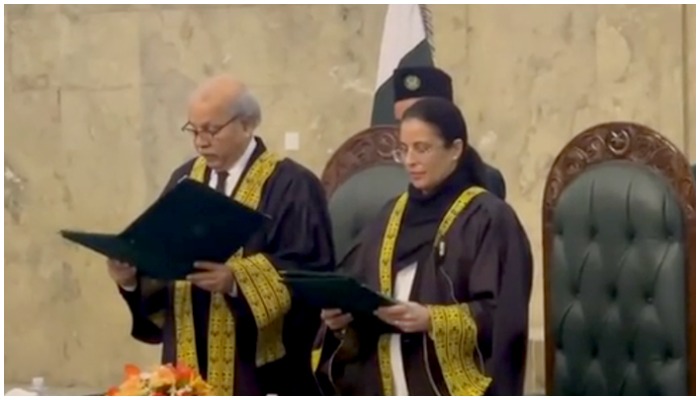In historic moment, Justice Ayesha Malik sworn in as first female Supreme Court judge of Pakistan
Prime Minister Imran Khan congratulates Justice Ayesha and wishes her all the best
January 24, 2022

- CJP Gulzar Ahmed administers oath to Justice Ayesha at Supreme Court.
- Justice Umar Ata Bandial and other SC judges attend oath taking ceremony.
- SC attains strength of 17 judges of whom eight belong to Punjab alone.
Justice Ayesha Malik has made history in Pakistan's judicial system after being sworn in as the first female judge of the Supreme Court of Pakistan, at an oath taking ceremony inside the Supreme Court building on Monday.
The oath was administered to Justice Ayesha by Chief Justice of Pakistan Gulzar Ahmed, while Justice Umar Ata Bandial, who has been nominated as the next top judge of Pakistan, and other SC judges, also attended the ceremony.
On the occassion, CJP Ahmed said that no one can take the credit for Justice Ayesha's appointment as an SC judge.
"Justice Ayesha has been appointed on the basis of her merit," the CJP said.
Meanwhile, Justice Ayesha's appointment as the first woman to serve as an apex court judge garnered massive applause from federal ministers and others on Twitter.
PM wishes Juistce Ayesha all the best
Prime Minister Imran Khan congratulated Justice Ayesha and wished her all the best.
'A land mark elevation'
Federal Minister for Information and Broadcasting Fawad Chaudhry shared a picture of Justice Ayesha taking the oath to congratulate her.
The minister expressed hope that the newly appointed judge will prove to be "an asset to our judicial hierarchy".
"A powerful picture symbolises the women empowerment in Pakistan, I hope she will be an asset to our Judicial hierarchy… Congratulations #JusticeAyeshaMalik a land mark elevation," Fawad wrote.
'Historic moment'
Federal minister for Human Rights Shireen Mazari also took to Twitter to acknowledge Justice Ayesha's appointment.
"Historic moment --- first woman judge of Supreme Court of Pakistan," Mazaari wrote.
'Inspiration for women'
Federal Minister for Science and Technology Shibli Faraz termed the appointment of Justice Ayesha as the first female apex court judge an "inspirational moment for the women" of Pakistan.
"A historic moment in the judicial history of Pakistan where a first woman,Justice Ayesha Malik takes oath as judge of Supreme Court. What an inspirational moment for women of this country!" he tweeted.
Here is how others reacted:
'Something to celebrate'
'Historic day'
The Judicial Commission of Pakistan (JCP) had approved the nomination of Justice Ayesha Malik for her appointment as an SC judge with a vote of five to four, on Thursday.
Justice Ayesha had been officially elevated to the rank of a judge of the apex court on Friday.
The final approval regarding the appointment of Justice Ayesha Malik had been sent to the Parliamentary Committee on Judges, after which the Judicial Commission of Pakistan (JCP) finally approved the nomination of Justice Ayesha Malik for her appointment as an SC judge with a vote of five to four, on Thursday.
The elevation of Justice Ayesha as an SC judge did not prove to be a cakewalk as lawyers from across the country had opposed her promotion making seniority a basis, as she is ranked fourth in the Lahore High Court in terms of seniority.
The Pakistan Bar Council had declared a strike against the appointment of Justice Ayesha Malik.
Out of the 17 judges appointed in the Supreme Court, Justice Ayesha Malik has been nominated for the seat which became vacant after the retirement of Justice Mushir Alam on August 17.
The CJP and Chief Justice of the Lahore High Court had suggested the name of Justice Ayesha Malik, to which Justice Ayesha also agreed in writing.
With Justice Ayesha taking the office as an SC judge, the apex court has attained the strength of 17 judges of whom eight belong to Punjab alone.
Besides Justice Ayesha, other judges from Punjab include Justice Umar Ata Bandial, Justice Sardar Tariq Masood, Justice Ijazul Ahsan, Justice Syed Mansoor Ali Shah, Justice Qazi Muhammad Amin, Justice Aminuddin Khan and Justice Syed Mazahir Ali Naqvi.
Interestingly, the four judges from Lahore who will now have the opportunity to become the CJP in future are Justice Umar Ata Bandial, Justice Ijazul Ahsan, Justice Syed Mansoor Ali Shah and Justice Ayesha A. Malik.
A brief profile of Justice Ayesha Malik
Born in 1966, Justice Ayesha completed her basic education from schools in Paris, New York, and Karachi, according to the LHC's website.
She completed her BCom from the Government College of Commerce and Economics, Karachi, and studied law at Pakistan College of Law, Lahore.
She did LLM from Harvard Law School and has also worked with Fakhurddin G Ebrahim. Justice Malik has appeared in the high courts, district courts, banking courts, special tribunals, and arbitration tribunals.
The justice was called upon as an expert witness in family law cases conducted in England and Australia involving issues of child custody, divorce, women's rights, and constitutional protection for women in Pakistan.
Justice Malik gave her landmark judgement back in June 2021, when she had declared virginity tests for examination of sexual assault survivors “illegal and against the Constitution of Pakistan."
A single bench led by Justice Malik announced the verdict in a set of petitions, filed in March and June 2020 by rights activists along with a PML-N lawmaker.
In the 30-page judgement, the judge wrote that the two-finger test (TFT) and hymen test have no medical basis or forensic value in cases of sexual violence and declared that virginity tests “offend the personal dignity of the female victim and therefore is against the right to life and right to dignity enshrined in Article 9 and 14 of the Constitution”.









